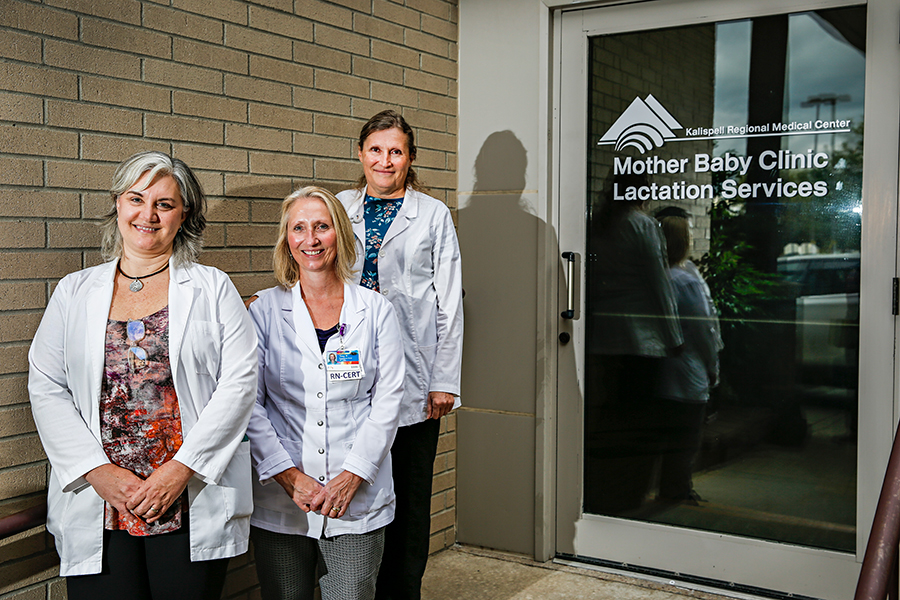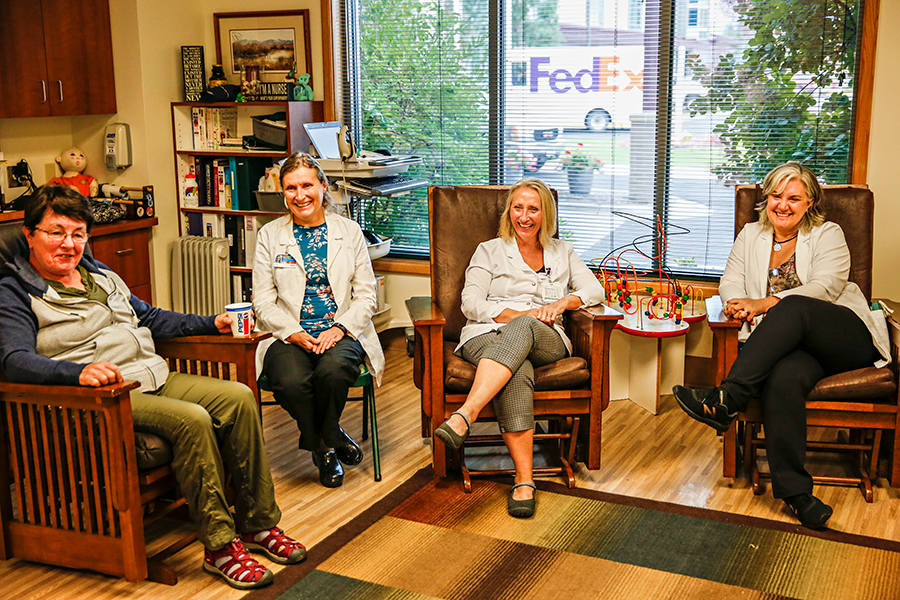Two Decades of Free Preventative Health Care
KRH’s Mother Baby Clinic offers free services to new parents and babies through an innovative and truly unique model of care
By Myers Reece
When Nancy Greer, then the director of the O/B department at Kalispell Regional Medical Center, proposed opening a mother-baby clinic in 1998, there wasn’t a template for such an undertaking, nor was there a particularly strong chance of convincing the administration. Her pitch was essentially, “We want to do more to help mothers and babies in the vulnerable days after birth, and we want to provide the services for free.”
But Greer’s determination, not to mention the medical benefits and fundamental humanity of her pitch, won over her superiors.
Two decades later, Kalispell Regional Healthcare’s Mother Baby Clinic remains without peer, serving countless families through a model of care that is attracting attention from health-care institutions across the country. It is an exemplar of preventative care that emphasizes patients over payments, and the nurses who run the clinic today praise the administration for its willingness to embrace Greer’s vision.
The registered nurse whom Greer put in charge of the program in 1998, Susan Tuszynski, recently recalled the ambitious mission of the clinic in the earliest days, a mission that still guides it today. The clinic sought to increase the rate of successful breastfeeding, as well as decrease the rates of readmission for problems such as failure to thrive and jaundice, which had the added bonus of benefitting the hospital through substantial cost savings.
“(Greer) had a vision, and she felt we could really make a difference,” said Tuszynski, who ran the clinic by herself for many years.
Ask nearly any new parent in the valley today, including many who visit the clinic numerous times free of charge, and it’s clear the program continues to make a significant difference.
Part of the impetus for the clinic’s formation was the shortened time span that new mothers spent in the hospital after giving birth. Traditionally, women often spent a number of days in the hospital with their newborns. But due to economics, driven by insurance companies only paying for 24 hours in the hospital, women were increasingly leaving far earlier, often before their milk had come in or they had developed a successful breastfeeding rhythm with their infant.
Tracy Wills, a registered nurse (RN) who joined the clinic after Tuszynski’s retirement in 2011, said the result of shortened hospital stays was increased potential for serious concerns such as infant undernourishment. Initial in-office pediatrician appointments aren’t typically scheduled for two weeks after birth, meaning there were about 14 critical days during which families were largely left to their own devices.
The clinic bridged that gap.
“That period of time is really crucial for weight loss and jaundice,” Wills said. “So we are intervening earlier and decreasing readmissions.”

Families can bring their babies in for weight checks, during which the clinic’s nurses examine the infant for anything else wrong. The nurses also provide education and support at a time that can be confusing and overwhelming for new parents, including by providing breastfeeding assistance and emotional support. All of the nurses are specially trained in lactation, and patients also have the opportunity to meet other new mothers.
“We manage a thousand different details, because we individualize our care with every single patient,” said Kaki Mendius, one of the clinic’s nurses. “Everyone is going to have different needs. Part of what we do well is assess those needs.”
Last month, the clinic had 597 patient contacts. In addition to Wills and Mendius, who is part-time, it also employs RN Doris Yeatts and part-time nurse Joan Siderius. It’s open 10 hours a day, seven days a week for appointments. Every Thursday afternoon is reserved for walk-ins from 3:30 to 5 p.m. Although the initial focus is the first two weeks of a baby’s life, patients are welcome to continue using the clinic, and often do for months or years.
There is no requirement that the baby be born at KRH to receive services, and patients come from across Northwest Montana and occasionally beyond. While other hospitals may provide aspects of the program, the nurses at the clinic aren’t aware of any others, anywhere, that offer the full range of services, always at no charge with the exception of certain offerings such as blood draws.
The clinic works closely with and refers to pediatricians and other providers to ensure the best care. The nurses don’t prescribe or diagnose, but rather serve as the physicians’ “eyes and ears,” Wills said.
The reason the model is unique, and that other institutions shy away from it, is that there is no reimbursement component. But the nurses say the cost savings from dramatically cutting down on readmissions, as well as the human capital of countless lives improved, more than make up for the lack of payments.
The nurses are all highly trained, with deep backgrounds in areas such as O/B and NICU care, and though the seven-days-a-week schedule can be grueling, they say they reap the rewards of greatly impacting their community.
“It started out as, ‘Let’s see how this can work,” Wills said.
“And 20 years later,” Tuszynski said, “we’re still offering a free service.”